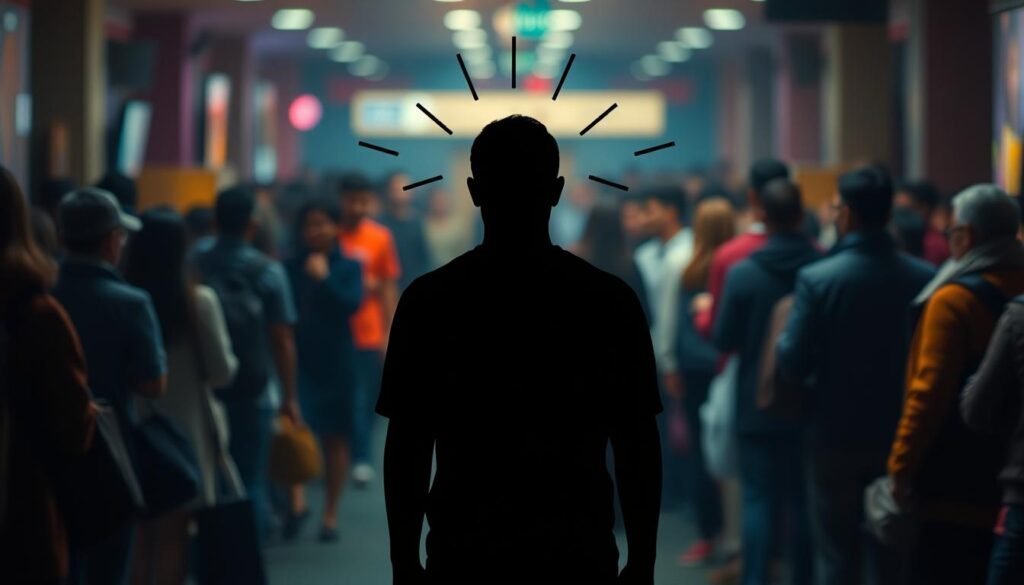About 15 million American adults are dealing with social anxiety disorder. This isn’t just feeling nervous. It’s a serious issue that affects their daily life. It starts in the teen years and can last into adulthood if not treated. This disorder can damage relationships, work or school performance, and overall happiness.
Knowing the signs of social phobia is key to getting help. Sadly, many wait over ten years to seek help. This delay is concerning since up to 90% of those with social anxiety also have other issues, like depression. Early help is crucial. For more info on getting help, check out this resource.
Key Takeaways
- Around 15 million adults in the U.S. suffer from social anxiety disorder.
- Symptoms typically begin during the teenage years.
- Many individuals wait over a decade before seeking treatment.
- A significant number of people with social anxiety have co-occurring conditions.
- Women are more frequently affected than men.
- Early intervention often leads to an improved quality of life.
What is Social Anxiety Disorder?
Social anxiety disorder is a serious mental health issue. It involves intense, ongoing fear of negative judgment in social settings. This social anxiety disorder definition highlights the struggle of coping in situations like public speaking or starting conversations. About 7% of people deal with this disorder, showing its significant presence in mental health discussions.
The characteristics of social anxiety usually start in the teenage years, often before turning 18. More women than men face social anxiety. In the U.S., 15 million adults have this disorder. It’s the second most common anxiety disorder after specific phobia.
While many feel anxious in social situations, those with this disorder face overwhelming fear. Sadly, less than 5% seek treatment within a year of symptom onset. Plus, over a third wait ten years or more to get help.
People with social anxiety disorder risk developing major depression or alcohol issues. Knowing this link is key for early help and improving lives of those with anxiety. To recognize signs of anxiety, check out this resource.
Identifying the Symptoms of Social Anxiety Disorder
It’s important to spot the signs of social anxiety disorder. It shows up through feelings and actions of worry. Knowing these signs helps in detecting the disorder and getting the right help.
Emotional Symptoms
One key symptom is a strong fear when being social. People may feel:
- Fear of negative judgment from others
- Persistent worry about embarrassing oneself
- Intense fear of new social places or strangers
- Heightened self-consciousness in public
This fear can really affect one’s happiness and life.
Behavioral Symptoms
Behavior symptoms include avoiding social settings. This affects everyday life. Typical actions are:
- Avoiding social gatherings or events
- Avoiding eye contact with others
- Refusing to participate in conversations
- Leaving situations early to avoid discomfort

Common Social Anxiety Disorder Symptoms
Many people feel various symptoms of social anxiety disorder. It’s important to know these signs. They show how the condition affects everyday life and relationships. Symptoms include emotional and physical reactions, leading to avoiding social interactions.
Fear of Being Judged
Worrying about what others think is a key symptom of social anxiety. This fear occurs in different social situations. It happens when meeting new people, speaking in public, or having casual talks. This fear can stop someone from being social, making them pull away from potentially stressful situations.
Avoidance of Social Situations
This fear often leads to avoiding social events. Those with social anxiety might skip gatherings, avoid being in the spotlight, or not do everyday tasks. They fear embarrassment or being judged. This makes the cycle of avoidance and fear continue.
Physical Anxiety Symptoms
The physical signs of social anxiety are very strong. They include:
- Rapid heartbeat
- Trembling or shaking
- Excessive sweating
- Dizziness
- Gastrointestinal distress
These symptoms make one even more self-conscious. It makes them more aware of their condition in social situations.

| Symptom | Details |
|---|---|
| Fear of Judgment | Excessive worry about negative evaluation from others leading to anxiety. |
| Avoidance Behavior | Deliberately avoiding social interactions or situations that may provoke anxiety. |
| Physical Symptoms | Includes rapid heartbeat, trembling, excessive sweating, and gastrointestinal distress. |
The Impact of Social Anxiety Disorder on Daily Life
Social anxiety disorder changes lives in many ways. It’s not just about feeling scared; it’s about facing real challenges every day. People with this disorder might feel like they’re always being watched. This makes it hard to talk and connect with others.
Physical signs like a fast heartbeat, feeling sick, or dizzy can happen in social situations. These issues might make someone want to stay away from people. This can lead to feeling very lonely. As a result, they might struggle with low self-esteem and not feel good about themselves.
In work or school, social anxiety makes group tasks or presentations scary. Worrying about upsetting others or making mistakes can impact job happiness and growth. If not addressed, it can lead to more serious problems, like depression or relying on substances for relief. Alcohol or drugs might seem like a way out, but they only lead to more problems.
Social anxiety affects more than just social life; it changes daily habits too. People might end up with few friends and spend a lot of time alone. Avoiding social activities becomes a common choice.
| Effects of Social Anxiety | Consequences on Daily Life |
|---|---|
| Fear of judgment | Avoidance of social settings |
| Low self-esteem | Difficulty forming relationships |
| Physical symptoms | Impeded work or academic performance |
| Substance abuse tendencies | Severe health implications |
Social anxiety is a big problem in the U.S., affecting many people. Getting help through therapy or programs can offer ways to cope. This support helps improve social skills. Taking steps to get help can change the impact of social anxiety on life.

Difference Between Social Anxiety and Shyness
Often, people mix up social anxiety and shyness, but they’re not the same. Shyness is a short-term, slight discomfort in social spots. It usually shows up in new places but doesn’t mess up daily life. Over time, shyness often goes away.
Social anxiety is more intense and complex. It means a deep fear of being judged or feeling embarrassed socially. Those with it might avoid social events or work meetings. This fear doesn’t just pass and can affect someone’s life majorly.
To make it clearer, here’s a table showing how social anxiety differs from shyness:
| Aspect | Shyness | Social Anxiety Disorder |
|---|---|---|
| Duration | Short-term, often context-specific | Long-term, can be chronic |
| Impact on Life | Minimal, may avoid certain situations | Significant, leads to avoidance of many social interactions |
| Emotional Response | Discomfort or nervousness | Intense fear and apprehension |
| Physical Symptoms | Rarely experiences physical symptoms | May have physical signs like sweating or shaking |
| Developmental Stage | Can affect individuals across all ages | Typically begins in late childhood |
It’s key to know the difference between social anxiety and shyness. Understanding what you’re facing helps find the right coping methods or treatments. Techniques like cognitive-behavioral therapy can be really effective for social anxiety.
Specific Signs to Look For
Knowing specific signs helps in identifying social anxiety disorder. Signs like anticipatory anxiety and fear of public speaking play a big role in impacting lives.
Anticipatory Anxiety
Anticipatory anxiety is a key sign that shows up weeks before social events. It reveals a deep fear of upcoming interactions. People often worry a lot about what could go wrong, feeling anxious and uneasy.
This worry can lead to avoiding social activities. The fear of what might happen can stop people from going out. This avoidance can limit personal and professional growth.
Fear of Public Speaking
Fear of public speaking is a major concern for many with social anxiety disorder. Just thinking about speaking in front of others can cause extreme fear. This can lead to physical symptoms like a racing heart, sweating, and shaking.
Such anxiety can block career progress and limit expressing oneself in groups.
| Signs | Description | Impact |
|---|---|---|
| Anticipatory Anxiety | Excessive worry about future social situations | Can lead to avoidance of social events |
| Public Speaking Anxiety | Fear of speaking in front of an audience | Limits professional growth opportunities |
Understanding these signs is vital for dealing with social anxiety disorder. It’s important to address both anticipatory anxiety and public speaking fears. Doing so can lead to better coping mechanisms and help confront fears.
When to Seek Help
Understanding when to seek help for social anxiety is crucial. This is especially true when symptoms disrupt daily life. They may greatly impact relationships and well-being. Knowing when symptoms are severe helps in deciding to get professional help.
Recognizing Severe Symptoms
Some people avoid all social situations because of their social anxiety. They steer clear of public speaking, parties, or making phone calls. They often feel overly self-conscious, fear judgment, and stress about social events.
Physical symptoms may include blushing, having trouble breathing, and shaking. When these feelings mess up daily life or relationships, seeking help is vital. You can do so here.
The Importance of Professional Assessment
Getting a professional assessment helps understand anxiety levels and treatment options. Many don’t seek help until their anxiety is too much to handle and has been for years. A mental health expert can offer personalized help, like therapy or medication.
Getting help early can improve life and reduce anxiety’s impact. You can start by taking a quiz to understand your anxiety. Check out these resources online.
Causes of Social Anxiety Disorder
The causes of social anxiety disorder include both genetic and environmental factors. It’s important to understand these causes. They help us find the best ways to treat and prevent it. Studies show that having family members with anxiety disorders can increase your risk.
Genetics and Family History
Having a family history plays a big role in social anxiety disorder. If your relatives have anxiety disorders, you might face similar issues. Some people might be more likely to get anxiety because of their genes. This risk can show up as anxiety symptoms in their teenage years or later. Negative social events can make this worse, leading to social anxiety disorder.
Environmental Factors
Environmental factors are just as critical in the development of social anxiety disorder. Bad experiences, like being bullied or family arguments, can make anxiety more likely. Also, if parents are overly protective or show anxious behavior, it can make avoiding situations more common. This increases the chance of getting social anxiety disorder. Being aware of these factors can lead to better help for those who struggle.